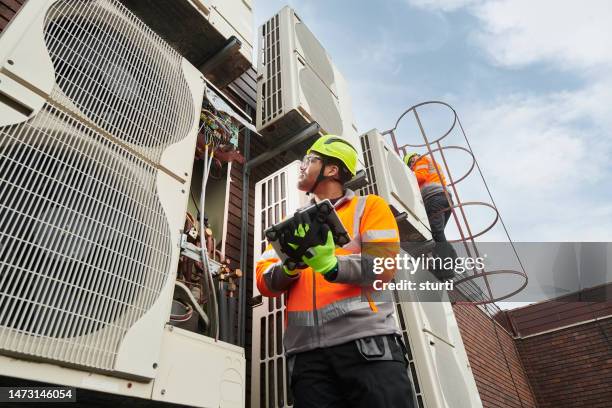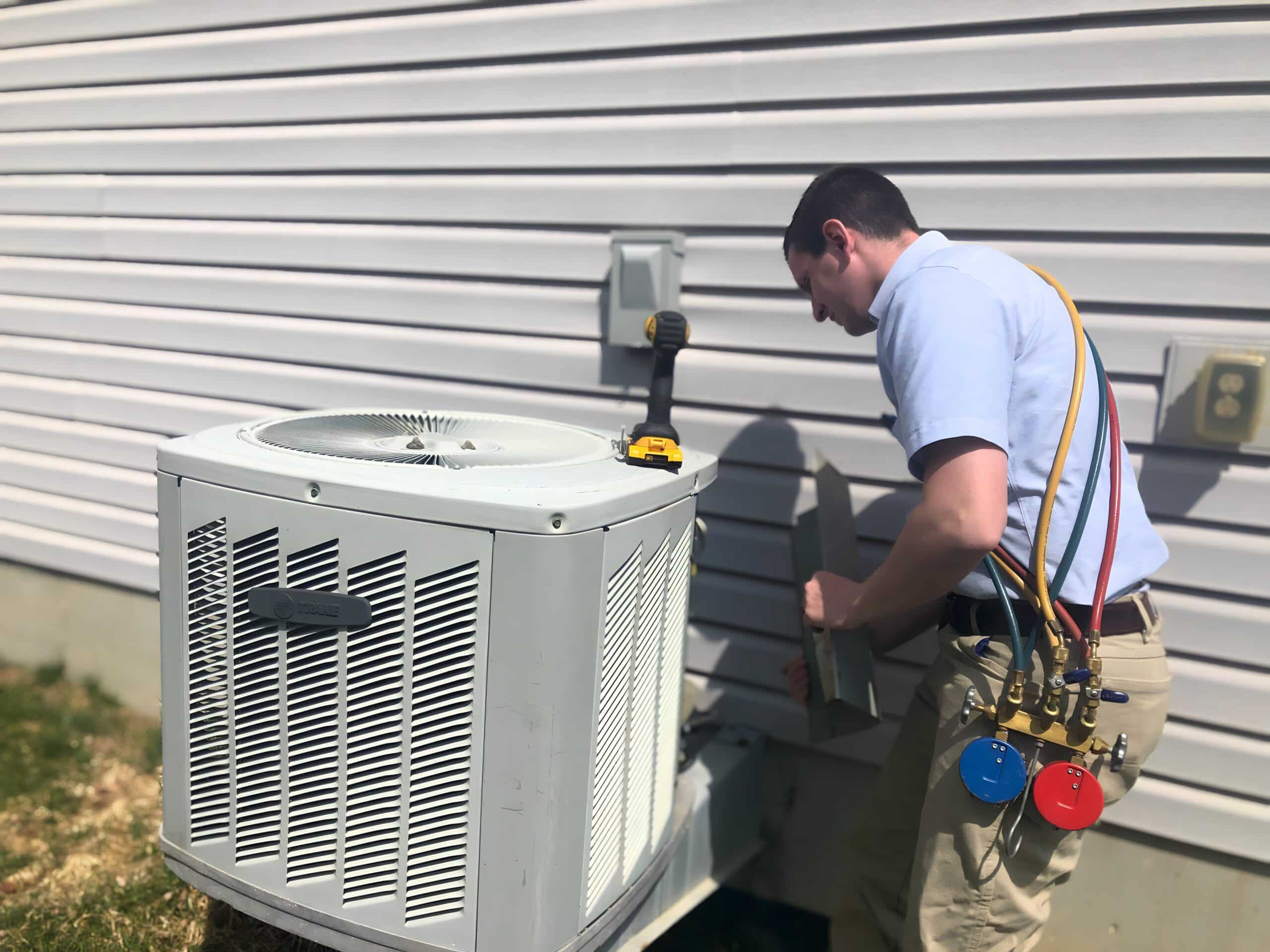Picking Between a Heatpump and Heater: Key Factors To Consider for Your Heating And Cooling Demands
When assessing heating alternatives for HVAC requires, the choice between a heatpump and a heater can be complicated. Each system provides distinctive advantages tailored to details environments and power efficiency objectives. Understanding these distinctions is crucial for making an enlightened choice. Key elements such as setup expenses and environmental effect better make complex the selection process. Which option absolutely lines up with one's comfort and sustainability choices? The complying with sections will certainly explore these factors to consider in detail.
Recognizing Warmth Pumps: Just How They Work and Their Benefits
While lots of home owners consider numerous home heating choices, recognizing exactly how heatpump function and their benefits can greatly influence their decision. Warm pumps operate by moving warm instead of creating it. In the winter season, they remove warmth from the outside air or ground and move it inside your home, while in the summer, they reverse this process, cooling down the home by removing heat outside. This twin capability makes them functional for year-round climate control.One of the main advantages of heatpump is their power efficiency. They utilize significantly less power contrasted to typical heater, possibly causing reduced energy costs (heat pump service). In addition, heatpump have a smaller sized carbon impact, making them an eco-friendly selection. They additionally require less maintenance than standard systems, contributing to long-term expense savings. In general, recognizing the mechanics and advantages of heatpump can assist homeowners make informed decisions concerning their home heating and cooling down requirements
Exploring Furnaces: Types, Operation, and Advantages
Heating systems come in numerous types, including gas, electric, and oil models, each with unique functional mechanisms. Recognizing these differences is vital, as they affect efficiency and heating performance. In addition, heating systems use countless advantages, such as constant warm outcome and reliability in chillier environments.
Kinds of Furnaces
Heating systems can vary substantially in layout and procedure, with heating systems being a prominent choice among property owners. There are several sorts of heating systems, each making use of various fuel sources and technologies. Gas furnaces prevail, leveraging all-natural gas to generate heat efficiently. Electric furnaces, on the other hand, make use of electric resistance to create heat, usually favored for their straightforward installation. Oil heating systems, while less usual, are efficient in locations with limited gas gain access to (furnace replacement). Furthermore, condensing heating systems take full advantage of power effectiveness by capturing and recycling exhaust gases. Each type operates through a system of heat exchangers and ductwork to distribute warm air throughout a home. Recognizing the distinctions between these heating system kinds is essential for notified a/c decisions
Benefits of Heaters
For property owners seeking trustworthy warmth during cold months, the benefits of heaters are substantial. Furnaces provide constant heating, guaranteeing even temperature levels throughout the home. They are particularly reliable in extreme cold, commonly outperforming heatpump in frigid conditions. Different types, including gas, electrical, and oil furnaces, offer adaptability to satisfy varied needs and preferences.Furnaces also often tend to have lower initial installment prices contrasted to heatpump, making them a much more obtainable option for lots of. Their durable layout adds to a longer life-span, with numerous systems lasting over 15 years with correct maintenance. Additionally, modern heating systems are typically outfitted with innovative modern technology for enhanced effectiveness, which can lead to minimized power bills. On the whole, heaters stay a reliable selection for efficient home heating.

Power Performance: Contrasting Warm Pumps and Furnaces
When comparing energy performance in between heat pumps and heating systems, the Seasonal Energy Effectiveness Proportion (SEER) plays a vital duty in figuring out efficiency. Furthermore, a functional price analysis discloses the long-lasting economic implications of each system. Understanding these elements can guide homeowners in making notified choices about their heating remedies.
Seasonal Energy Performance Proportion
Power performance plays an important function in the decision-making process between warm pumps and furnaces, especially when considering the Seasonal Energy Effectiveness Proportion (SEER) This statistics actions the cooling effectiveness of heatpump over an entire air conditioning period, offering a standardized way to evaluate efficiency. Greater SEER scores suggest higher power effectiveness, translating to lower energy consumption and reduced utility bills. In contrast, heating systems are typically analyzed making use of the Annual Gas Application Effectiveness (AFUE) rating, which mirrors home heating effectiveness. When contrasting these two systems, homeowners should focus on SEER rankings for warmth pumps, as they directly influence general energy cost savings and ecological sustainability. An extensive understanding of SEER can especially influence the long-term satisfaction and cost-effectiveness of the selected cooling and heating remedy.
Functional Expense Analysis
Understanding the operational costs connected with heatpump and heating systems is crucial for homeowners reviewing their alternatives. Heatpump generally provide greater energy performance, transforming electrical power into heat with minimal waste. This leads to lower regular monthly utility expenses, especially in modest climates. On the other hand, standard furnaces, specifically gas designs, may have lower upfront prices however can incur higher functional costs gradually due to sustain rates Continue and effectiveness ratings.Moreover, warm pumps can work as both home heating and cooling systems, possibly lowering the requirement for separate heating and cooling systems. While first investments for warmth pumps may be higher, their long-lasting cost savings in power efficiency can make them an extra economical selection for several homes. Mindful analysis of local power rates is vital to establish the most effective choice.
Installation Expenses: What to Anticipate for every Heater
Setup prices for furnace can differ considerably in between warmth pumps and furnaces, influencing property owners' decisions. Warmth pumps usually have higher ahead of time installment costs, usually varying from $3,500 to $8,000, relying on the system dimension and complexity of installation. This consists of the exterior unit, interior handling system, and required ductwork adjustments. Conversely, furnaces have a tendency to have reduced initial expenses, averaging in between $2,500 and $6,000, which can be appealing for budget-conscious home owners. Nonetheless, installation expenses can boost if substantial ductwork is required.Moreover, the choice of gas type for heaters-- gas, propane, or electrical-- can additionally influence installation costs. While warm pumps supply power performance, their preliminary financial investment might prevent some purchasers. Ultimately, reviewing installation prices together with long-term cost savings and efficiency will certainly aid home owners in making notified choices concerning their heating unit.
Environment Factors To Consider: Which System Performs Better in Your Area
Exactly how do environment conditions affect the effectiveness of heater? The performance of heatpump and heating systems can differ substantially depending on the regional environment. In moderate environments, warm pumps succeed by efficiently transferring warm from the outside air, making them an energy-saving alternative. Their performance reduces in very cool temperatures, where they may have a hard time to extract sufficient warmth. On the other hand, heating systems, especially gas models, provide consistent and reliable warm no matter outdoor problems, making them better in colder regions.In locations that experience milder winters, heatpump can run successfully year-round, offering both heating & cooling. On the other hand, areas with rough winter seasons often gain from the robustness of heating systems. Eventually, recognizing the local climate is important when deciding between a warm pump and a heater, as it straight influences their functional effectiveness and total performance.
Upkeep Needs: Long-Term Care for Warmth Pumps vs. Furnaces
While both heatpump and heating systems need regular upkeep to ensure peak efficiency, their certain requirements and care regimens differ significantly. Furnaces generally need much less frequent focus, with annual inspections sufficing to examine for gas leakages, clean filters, and assess overall functionality. Their simpler style commonly enables for uncomplicated repairs.In contrast, heat pumps require semiannual upkeep due to their double role in home heating and cooling. This includes cleaning coils, checking cooling agent degrees, and guaranteeing that both the exterior and indoor units operate at their ideal. Additionally, warm pump upkeep often includes more detailed parts, making specialist servicing essential.Neglecting upkeep can result in decreased effectiveness and boosted power expenses for both systems. Ultimately, property owners must think about these long-term treatment needs when selecting in between a heatpump and a heating system, as positive maintenance can prolong the life expectancy and performance of either system considerably.
Ecological Influence: Selecting a Sustainable Home Heating Alternative
The environmental impact of furnace is a vital examination for homeowners looking for sustainable options. Heat pumps are typically a lot more energy-efficient than typical heating systems, as they move warmth instead of generate it, greatly lowering carbon discharges. By making use of renewable resource sources, such as geothermal or air-source heat pumps, house owners can additionally lessen their eco-friendly footprint.On the various other hand, gas furnaces produce greenhouse gases and add to air pollution, though they usually offer greater heat result. Developments in innovation have led to the advancement of high-efficiency heating systems that decrease emissions.Ultimately, published here choosing a heating system includes considering performance against environmental effect. House owners are motivated to mirror on regional energy resources and motivations for eco-friendly systems, ensuring a choice that aligns with both individual convenience and ecological responsibility. The choice impacts not only instant comfort yet additionally lasting sustainability and ecological wellness.
Often Asked Concerns
How Long Do Warmth Pumps and Furnaces Commonly Last?
The lifespan of heatpump commonly varies from 15 to 20 years, while heating systems can last in between 15 to thirty years. Normal maintenance significantly influences their durability and effectiveness in offering home heating services.
Can I Use a Heatpump in Extremely Cold Climates?
Warmth pumps can run in exceptionally chilly environments, however their performance reduces as temperatures decline. In such problems, additional home heating sources may be needed to keep comfortable indoor temperatures and ensure peak performance.

What Is the Noise Level of Warmth Pumps Versus Furnaces?
The sound levels of heatpump and heaters differ considerably. Normally, warm pumps run even more silently than conventional heaters, making them more suitable for those conscious sound, while heaters might produce louder functional sounds during heating cycles.
Are Warm Pumps Suitable for Both Heating & Cooling?
Heat pumps are undoubtedly appropriate for both heating & cooling (heat pump replacement ooltewah tn). They function by transferring warm, giving efficient temperature level control year-round, making them a versatile selection for property owners looking for an all-in-one cooling and heating remedy
What Dimension Heating Unit Do I Need for My Home?
Determining the suitable dimension home heating system for a home needs assessing variables such as square footage, insulation top quality, neighborhood environment, and the home's layout. Consulting a specialist can ensure an accurate evaluation and ideal convenience. Heat pumps normally provide greater power efficiency, transforming electrical energy into warmth with minimal waste. In moderate environments, warm pumps excel by efficiently transferring warm from the outside air, making them an energy-saving choice. On the other hand, heaters, specifically gas models, provide regular and reputable warmth no matter of exterior conditions, making them more suitable in pop over to these guys cooler regions.In areas that experience milder wintertimes, warm pumps can operate successfully year-round, offering both heating and air conditioning. Warmth pumps are generally a lot more energy-efficient than traditional furnaces, as they move warmth rather than create it, significantly minimizing carbon exhausts. By utilizing sustainable energy resources, such as geothermal or air-source heat pumps, homeowners can even more decrease their ecological footprint.On the various other hand, natural gas heating systems emit greenhouse gases and add to air contamination, though they often offer greater warm outcome.